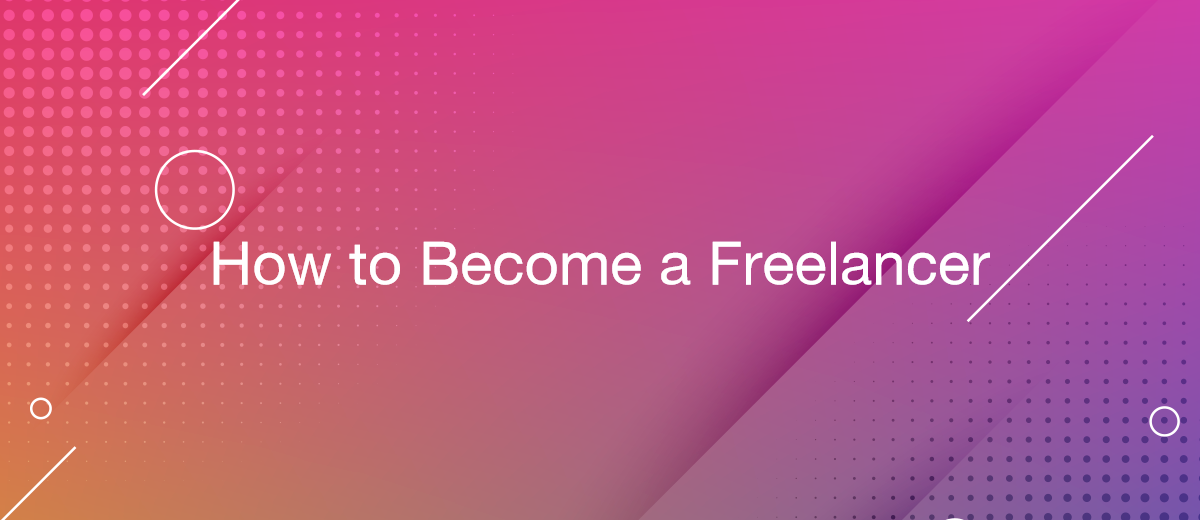How to Become a Freelancer
Many office workers dream of starting to work for themselves without being tied to the office and the boss. The prospect of having a free schedule and the opportunity to do what you love from anywhere in the world make freelance work or so-called freelancing even more tempting. Given the relevance of this topic, we decided to dedicate an article to it. From it, you will learn what freelancing is, how to become a freelancer, what professions this employment format is relevant for, what skills and abilities it will require, and what are its advantages and disadvantages.
What is a Freelance
First, let's define what this term means. Some consider freelancing to be synonymous with remote work, although there are significant differences between these terms. Today, for various reasons, many full-time employees are working remotely, a trend that has become especially widespread during the COVID-19 pandemic.
If you are interested in how to be a freelance, please note that most
often these specialists do not have a permanent job. Instead, they are
content with one-time or regular orders from several employers, but at
the same time they can enter into employment contracts for permanent or
temporary work on current projects and tasks.
Thus, freelancing is akin to a blend of full-time employment and entrepreneurship. On one hand, independent specialists earn from their knowledge and skills - that is, they sell their time for a predetermined salary, like full-time employees. On the other hand, they divide their working time among several employers, and also have to look for projects on their own, promote their services in the labor market, manage finances and taxes, maintain their workplaces, and so on.
Before you get seriously interested in how to become a freelancer, you should first find out what areas of activity this type of employment is suitable for. As a rule, remote freelance work is most relevant for creative and IT/digital professions, although not only for them. The development of advanced technologies has made freelancing accessible even to those professionals who previously could not even imagine the possibility of working remotely. A good example is the growing demand for telemedicine, which allows doctors to see patients remotely via the Internet. This also includes tutoring and a number of other activities. In the next section of our article, we will talk about them in more detail.

Freelancing attracts people with its flexibility and versatility. This employment format is suitable for literally everyone who has access to the Internet, spare time and a desire to earn money. It can be combined with the main work in the office, study, vacation, maternity leave and even retirement. Now let's move on to the specifics and consider how to become freelance, what hard and soft skills are needed for this activity, as well as what professions it is best combined with.
Freelance Professions in Demand
How do I become a freelancer? This question is usually asked by those who have already realized that this format of employment is exactly right for them. To answer it, you first need to find out in which direction you are going to work or what specialization you plan to master. As we have already noted, modern professions from the IT and digital fields are best suited for freelancing. But in general, this format is suitable for almost any specialist who can work remotely.
The following professions are most in demand for freelancers:
- Programmer. Developers of software, games, websites, mobile applications, as well as system administrators, testers and other IT specialists are extremely in demand in the freelance market.
- Designer. These professionals also often work remotely and freelance. Many orders and vacancies are published on freelance exchanges for different areas of design: illustrations, banners, logos, corporate identity, development of printed materials (catalogs, flyers, brochures), presentations, website design, mobile applications, UI/UX design and much more.
- Copywriter. This profession is mentioned in almost all articles and guides on the topic “How do you become a freelancer”. Specialists in writing commercial texts and other types of text content (journalists, editors) are no less in demand on the freelance market. Specialties that involve working with texts have a fairly low entry threshold, so they are often chosen by novice freelancers without skills and experience.
- Translator. Independent remote workers often become translators or interpreters who speak foreign languages, from English to Japanese. Experienced translators who can work with technical, legal, medical or other complex topics are especially in demand. In addition, there are many vacancies in literary translation.
- SMM specialist. Social media specialists can easily find freelance work for themselves. They help companies and brands advertise themselves and their products on popular social networks: they analyze the niche and competitors, develop a promotion strategy, draw up a content plan, prepare content, think over activities, and interact with the audience.
- Targetologist. These specialists are also engaged in promotion in social networks, but they are singled out as a separate profession, which is also very popular in freelancing. They set up targeted advertising campaigns on popular social networks (Facebook, Instagram, LinkedIn) for a specific target audience.
- SEO optimizer. SEO is one of the oldest freelance professions. It promotes websites in search engines using external and internal optimization methods.
- Contextual advertising specialist. This popular IT profession can also often be found in materials on the topic “How can I become a freelancer”. Its representatives set up and run advertising campaigns on Google Ads and other platforms, as well as analyze their results.
In addition, freelancing has jobs for many other professionals: photographers, audio and video makers, PR managers, marketers, tutors, owners of online courses and schools, accountants, lawyers, stylists, business consultants, nutritionists and more.
What do You Need to Get Started
Answering the question of how to become a freelance worker, we will give some recommendations on the starting period. It is essential important, as most new freelancers face the same problems at this time. Knowing them will help you find ways to solve them faster, get through this difficult stage more comfortably and become an experienced, confident specialist.
Create a financial cushion
Before switching to freelancing, you should not resign from your previous job. Wait until a certain financial cushion accumulates. It should be enough for at least 3–4 months of life.


Freelancing is similar to a business in that here you will not start earning more or less tangible amounts immediately. First you have to work for small fees to gain experience, create a decent portfolio and acquire regular customers.
Create a work schedule
The most important quality of a successful freelancer is self-discipline. After all, you will not have a boss standing behind your shoulder and controlling the workflow. Therefore, with insufficient self-discipline, you can start postponing and rescheduling tasks, which will lead to missed deadlines and dissatisfied customers.
Creating a thoughtful schedule is a real must-have for anyone new to freelancing. Adhere to time management principles that will help you manage your work time more effectively.
Calculate your price
How to work as a freelancer if you don't know how much your services cost? No way. Therefore, before taking on any project, it is worth considering and soberly assessing the cost of your work. This is an essential point, as customers often ask freelancers to estimate the cost of a particular task or project.
The pricing of freelance services is very flexible and depends on the specific profession. Some put up a certain rate for an hour of their work. That's what programmers usually do. Others measure the amount of work in other conventional units. For example, many writers and translators count the number of characters in their writing and set a price tag per 1,000 characters.
When calculating the price, it is recommended to focus on the average market prices. True, novice specialists are often forced to take low-paying orders to complete their portfolio and build a client base.
Learn to communicate with clients
Communication skills are essential for any freelancer. Remember that you will not only be an employee, but also a sales manager for your services.
Many customers are looking for freelance inexperienced, but qualified professionals for low-paid work. Also, cases of fraud are not uncommon when novice freelancers do not receive payment for their work or receive it in part. Communication skills with clients, the ability to communicate your value to them and not fall for attempts to bring down the price will help to avoid many potential problems associated with fees.
Market yourself
The final item in the checklist "How to be a successful freelancer" is the promotion of services. Some people believe that it is enough just to do your job well, and clients will appear on their own, but this is not entirely true.
On major freelance exchanges, you will have to compete for orders with many other freelancers from all over the world. Without preconceived methods of self-presentation, this will be quite difficult. You can use various channels for promotion: paid placement on stock exchanges, contextual advertising, social networks, blogging with original thematic content, and so on.
Advantages and disadvantages of freelance
Many of those who are keen to learn how to start as a freelancer are also interested in the advantages and disadvantages of independent freelance work. Among the advantages of employment in this format are:
- Flexible schedule. Freelancing is best suited for those who are tired of the standard five-day office “from 9 to 6” and want to decide on their own when to work and when to rest. Most freelancers themselves measure and control their working time, as customers only want to get the desired result within the agreed time.
- Unlimited income. Hard-working freelancers earn more than their counterparts in the state, as they have no salary cap. Their income depends on professional qualities (qualifications, experience), as well as on the volume and complexity of the orders. Freelance specialists can independently regulate the level of workload, and with it, the number of earnings.
- Workplace selection. Freelancers are not tied to a specific place of work. They can work from home, out of town, or from virtually anywhere in the world. To achieve this, they only need a laptop and access to the Internet. Much travel regularly or even live abroad for years, moving between different countries and becoming so-called “digital nomads”.
- Saving time and money. Freelancers don't have to waste time on long, tedious commutes to and from work. They also do not have many expenses that noticeably deplete the wallets of office workers: for transport, office lunches, clothes/shoes appropriate to the dress code, and so on.
However, those who want to know how to become a successful freelancer should also be aware of the disadvantages of working in this format. Main cons:
- High competition. In many freelance professions, the supply of specialist services significantly exceeds the demand for them from customers. The competitive environment is especially critical for beginner freelancers: they can’t find jobs for a long time and are forced to accept below-market rates to build up a portfolio and references.
- Unstable income. Freelancing cannot guarantee a stable monthly income at a certain level. Every freelancer has downtime sporadically for one reason or another, which immediately negatively affects income. Therefore, it is essential before switching to freelancing to accumulate a financial cushion for the most painless overcoming of such periods.
- Lack of social guarantees. Another tangible disadvantage of independent freelance work is the lack of paid sick leave, vacations and other social guarantees. Official freelancers pay relatively low taxes, but because of this, they are unlikely to be able to count on a large pension.
- Expenses for the arrangement of the workplace and the promotion of services. The Freelancer is solely responsible for the availability and serviceability of the equipment and software necessary for the work. If your laptop is broken, the customer is unlikely to agree to pay for its repair. You will have to do it from your own pocket. This also includes the cost of paying for the services of freelance exchanges, promoting your resources on the Internet, resolving tax issues, and so on.
Let's sum up
Becoming a freelancer can be a rewarding and flexible career choice. It offers you the freedom to choose your projects and work from anywhere, anytime. However, it also requires discipline, strong communication skills, and a proactive approach to finding work and managing your business.
Remember, the journey to becoming a successful freelancer involves constant learning and adaptation. It's important to continually improve your skills, network with other professionals, and keep up with industry trends. By staying organized, setting clear goals, and maintaining a strong online presence, you can attract and retain clients.
Strive to take your business to the next level, achieve your goals faster and more efficiently? Apix-Drive is your reliable assistant for these tasks. An online service and application connector will help you automate key business processes and get rid of the routine. You and your employees will free up time for important core tasks. Try Apix-Drive features for free to see the effectiveness of the online connector for yourself.

